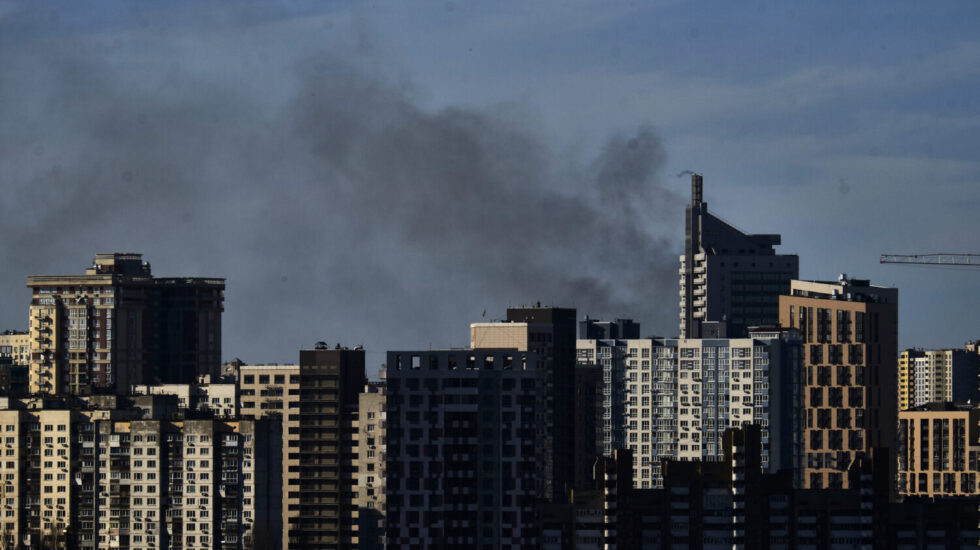On Tuesday, the sixth day of their invasion of Ukraine, Russian forces escalated their attack on the nation’s two largest cities, Kyiv and Kharkiv.
The Associated Press reports that a “40-mile convoy of tanks and other vehicles threatened the capital” while Russian bombs targeted a central square and residential areas in Kharkiv, an eastern city with a population of 1.5 million.
Ukrainian President Volodymyr Zelensky called the attack of the square a “war crime” and “frank, undisguised terror.” At least sixteen civilian deaths have been reported in Kharkiv in the last two days and a maternity ward was forced to relocate to an underground subway station. According to The Wall Street Journal, “Some 87 Kharkiv apartment buildings have been damaged, and several parts of Kharkiv no longer have water, electricity or heating.”
Since the outset of the conflict, more than 660,000 Ukrainians have fled their homeland, with a large majority traveling to neighboring Poland. The U.N. says there has been at least 136 civilians deaths.
Reports also emerged that Russia has used cluster bombs on civilian targets, a violation of international law.
The untamed Russian aggression is likely a byproduct of their frustration. Despite having vastly superior resources and military might, the Russians have been unable to achieve their early objectives – like neutralizing Ukraine’s air force – and the Ukrainian resistance has stymied their progress. Citizens have been taking a DIY approach to warfare, erecting makeshift barriers and concocting Molotov cocktails.
“A big fear among U.S. military officials is that Russia, having suffered initial setbacks, will unleash a huge bombardment of missiles and airstrikes on not only Kyiv, but other cities where there’s serious resistance,” explains The New York Times’ Eric Schmitt.
Russia might also be getting an assist from Belarus. The Washington Post reports that the country’s autocrat, President Alexander Lukashenko, is preparing to send soldiers to help the Russian invasion.
Western countries have increased their military support to Ukraine in recent days, shipping thousands of guns and anti-tank weapons. Ukraine has asked for a more active intervention, but the West is reluctant to directly engage in a conflict with a nuclear power.
The AP explains:
For the second day in a row, the Kremlin raised the specter of nuclear war, announcing that its nuclear-capable intercontinental ballistic missiles, submarines and long-range bombers had all been put on high alert, following President Vladimir Putin’s orders over the weekend.
To discourage Putin’s worst instincts, the West has levied a series of sanctions and financial penalties on the Russian government, key financial institutions, and the oligarchs that help prop up Putin’s regime.
The Washington Post reports:
The value of the ruble fell nearly 30 percent early Monday after several nations, including the United States, moved over the weekend to block the Kremlin’s access to its sizable foreign currency reserves in the West and cut off some Russian banks from the SWIFT financial messaging system. Scattered antiwar protests continued in Russia, and lines formed at some banks and cash machines as Russians sought to withdraw their money.
In ways large and small, Western nations and their populations moved to express their displeasure with Russia and cut it off from the rest of the world. Historically neutral Switzerland said it would join European Union sanctions against Russia and froze the bank accounts of sanctioned Russians. Finland, also neutral, said it would send arms to Ukraine.
Russian and Ukrainian leaders met on Monday in Belarus, but little progress was made. The New York Times provides key context:
The Kremlin wants its security demands taken into account “unconditionally,” President Vladimir V. Putin told the French president, Emmanuel Macron, as talks were underway. Those include the recognition of Russian sovereignty over Crimea, and “demilitarizing and denazifying the Ukrainian state and ensuring its neutral status,” meaning that it gives up a right to join the NATO alliance.
After the talks, Zelensky said he won’t make concessions without a ceasefire. It’s hard to engage in dialogue, he explained, while “one side is hitting the other with rocket artillery.”
Zelensky instead signed an application to join the European Union. “Our goal is to stand alongside all Europeans and, most importantly, to stand on their level,” Zelesnky said.



